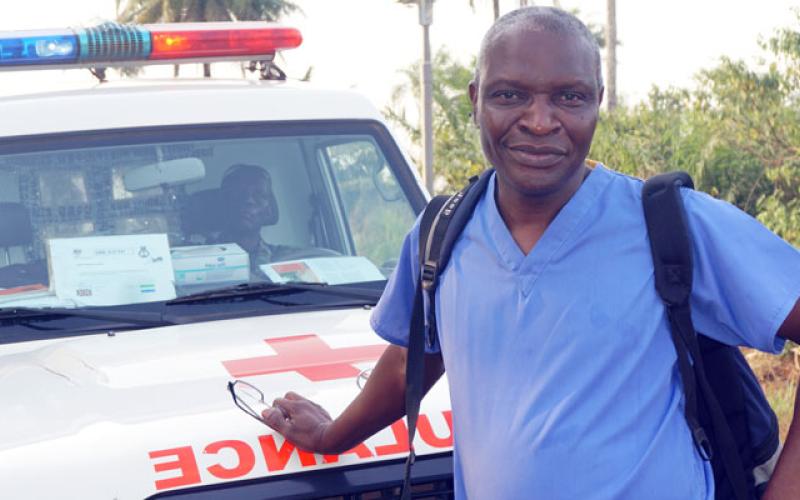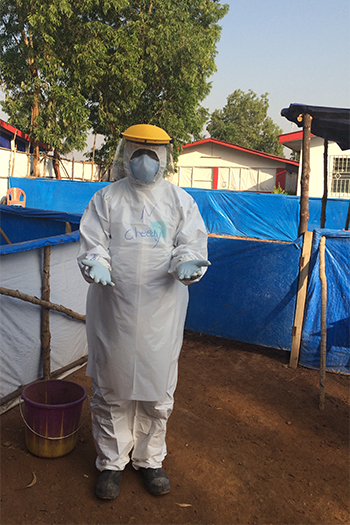
Nursing professor who treated Ebola patients describes psychological toll.
As the coronavirus threatens health and upends daily life throughout the world, UofSC Today is turning to our faculty to help us make sense of it all. While no one can predict exactly what will happen in the coming weeks and months, our faculty can help us ask the right questions and put important context around emerging events.
Cheedy Jaja, a Fulbright Scholar and associate professor at the College of Nursing, in 2014 and 2015 served as a frontline health care provider during the Ebola epidemic in Sierra Leone, his birth country. Jaja is a former tenured philosophy professor and board-certified psychiatry and mental health nurse practitioner. He provides insight about the mental health impact of the pandemic and the implications for Sierra Leone.
What surprised you when you started working on the front lines of the Ebola epidemic?
 Before we traveled to Sierra Leone, we had training and simulations in the United States so I formed this picture in my head of what it would be like: I’m going to be dressed in personal protective equipment, I’m going to be in this hospital, and everything is going to be very clinical and very organized.
Before we traveled to Sierra Leone, we had training and simulations in the United States so I formed this picture in my head of what it would be like: I’m going to be dressed in personal protective equipment, I’m going to be in this hospital, and everything is going to be very clinical and very organized.
The reality was very, very different. My first day in the Ebola hospital, I had to confront dealing with a patient who had died overnight. I thought, ‘My God, what am I doing here? What was I thinking?’ But then you realize that you are a clinician, that you are there to help and to make a difference. That mindset just clicks. You are aware that you have the clinical training — if not the experience — to help.
As nurses, we are trained to be compassionate and we try to be, but it was hard to be compassionate when you are filled with dread. You have to be alert and hypervigilant all the time to not become infected. Everybody that I worked with at some point thought they had contracted Ebola. I thought I had gotten it maybe 100 times.
The procedures and guidelines were changing constantly and we were learning in real-time, but unfortunately there was very little attention paid to the psycho-social health of the health care workers. Somebody died every day. In order to function, you don’t allow that sense of sadness to overcome you. You don’t feel that sense of grief or loss. You accept this is reality: some people will die, some will survive. You just stay focused and put all those emotions on hold.
Health care workers like Cheedy Jaja wore face shields, masks, gowns and several layers of gloves to protect themselves from contracting the Ebola virus. "You are sweating under your face mask," he says. "You lose a lot of fluid. Your face shield gets fogged up. You can’t see. You soldier on."
What was it like when you started to mentally and emotionally process your experience?
It wasn’t until my colleagues and I returned to the states and had to spend 21 days in quarantine that we started to revisit the death and grief that we experienced. For me and for a lot of other people, unpacking in isolation was what prompted the psychological trauma. Psychological trauma for me was like falling down a bottomless pit, just tumbling down a black hole with no end in sight.
You go through emotions of grief, sadness and anger. You’re angry that people are dying out there and you’re stuck home. You’re angry, thinking that, ‘Oh gosh, I didn’t do enough.’ There’s a sense of grief because you can recall vividly those who died, both adults and kids. There’s a sadness that you didn’t have the wherewithal to help them. There’s sadness, too, because you bonded with a lot of patients. I bonded with kids who are calling me uncle because I brought them treats. The images stay with you. You’re angry that you feel ostracized. You’ve gone out to make a difference for humanity, but now you’re stuck at home. It was a rollercoaster of contrasting emotions.
What helped was the realization that I wasn’t the only one feeling these emotions. My colleagues were equally going through the same thing. Someone came up with the brilliant idea: why don’t we have daily Skype meetings? We would spend hours a day just talking about what happened. We felt like we were soldiers coming back from battle. It was that daily Skype talk that helped pull us through our psychological trauma.
Those were the short-term consequences. For some of my colleagues, the trauma came at the cost of their marriage, their relationships. For me, I decided that what I needed to do is to go back and reinforce that experience. I realized that I felt that I didn’t do much, and the way I could overcome that sense of guilt was to go a second time. I went back in a leadership role and with a much stronger, more informed perspective.
But with the coronavirus pandemic now, just watching the news triggers memories and emotions I thought I’d gotten rid of five years ago.
What similarities do you see between the Ebola epidemic and the coronavirus pandemic?
This is very startling for me. I’m beginning to see some striking similarities between the Ebola experience and the coronavirus experience, both from a clinical standpoint and a community standpoint.
In my Ebola experience, when somebody got admitted to the hospital, they would leave their loved ones behind because of the contagious nature of the virus. For those patients who end up dying, that’s the last time that they interacted with their family. I’m beginning to see that same thing happening here with the coronavirus. When patients die, the trauma of that experience not only impacts the health care workers who have to communicate that information to their loved ones but also to the loved ones who never had the opportunity to say goodbye.
That’s going to create psychosocial trauma. That’s something that we need to address. I think there should be a way to connect those who are admitted here with loved ones outside by phone or internet.
Another thing I notice is very similar with this pandemic is that entire communities go through a very stressful period. You wake up in the morning, and you get bombarded with news. This general sense of being unsafe creates stress for individuals. You wonder, ‘Am I going to get infected? What happens if I get infected?’ You end up having a whole community that is traumatized.
Psychological trauma for me was like falling down a bottomless pit, just tumbling down a black hole with no end in sight. ~ Cheedy Jaja, associate professor of nursing
What is your outlook for Sierra Leone as coronavirus spreads in Africa?
I am very frightful. Post-Ebola Sierra Leone, like many African countries, has a very fragile health care system. There’s not enough doctors, nurses and other health care workers. There is always a scarcity of medical supplies. They don’t have enough facilities for isolating the coronavirus patients if there is an outbreak in the country.
What’s equally worrying is that if the number of infections starts increasing, I don’t have any confidence that the cavalry will be coming this time. Last time with Ebola, the entire world mobilized to help out. But almost every country now has to deal with their own outbreak.
If this coronavirus gets a foothold in the country and the government does not take the necessary proactive measures, it’s going to rage like a wildfire in the country. Ebola will pale in comparison. That’s my biggest fear.
Helping the helpers
Nursing professor Cheedy Jaja says health care workers need mental health support from the community. That support can be as simple as phone calls, texts or emails, which help them feel connected and convey the impression that we’re all in this together.
Original article: Used with permission from Dr. Cheedy Jaja

